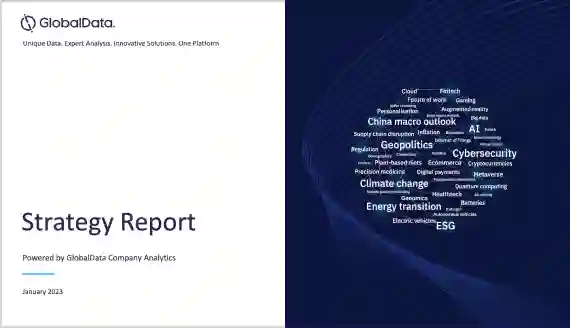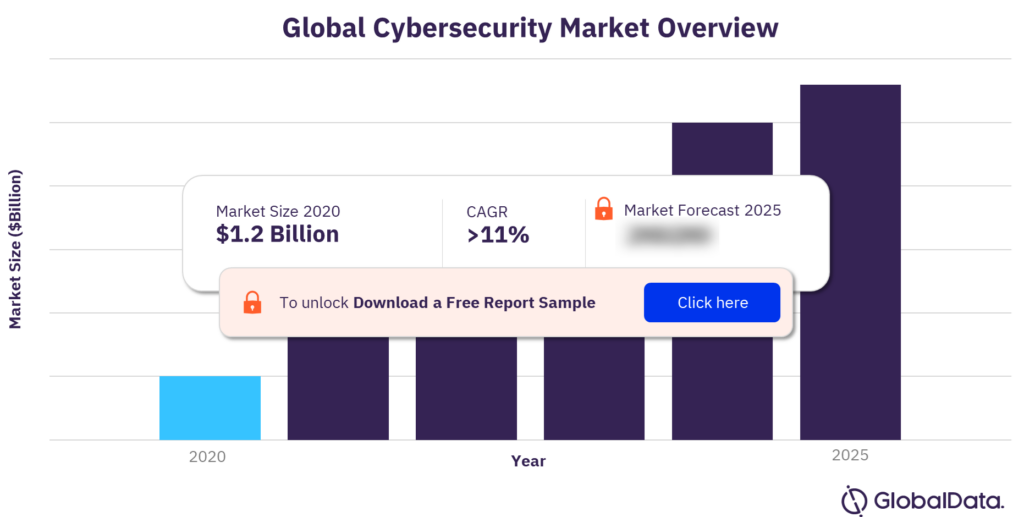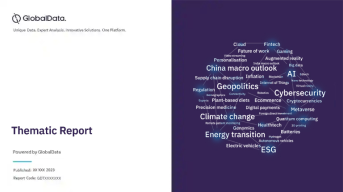Cybersecurity in Foodservice – Thematic Research
Powered by ![]()
All the vital news, analysis, and commentary curated by our industry experts.
Cybersecurity In Foodservice Market Overview
The global cybersecurity revenue in foodservice was $1.2 billion in 2020. The market is expected to grow at a CAGR of more than 11% during the forecast period. The COVID-19 pandemic forced foodservice companies to digitally transform, shifting to online delivery, remote communication with employees, and digitalizing supply chain management.
Foodservice suppliers that neglect the cybersecurity of operational technology (OT) are at risk of increasingly frequent and complex ransomware attacks, as evidenced by JBS’ ransomware attack in 2021. The growth of ransomware as a service (RaaS) will only expedite the importance of OT chip-based cybersecurity.
The Global Cybersecurity Market Overview
For more insights on the global cybersecurity market forecast, download a free report sample
What is the impact of cybersecurity in the foodservice market?
Corporate boards face increasing pressure to adopt more sustainable policies, but companies must assess their impact on society. Human rights violations come in many forms, including data breaches, as every individual has a right to privacy. Foodservice companies process and store a wealth of employee and consumer data. Breaches of security can lead to unauthorized access, use, destruction, loss, alteration, or disclosure of this personal data.
COVID-19 has increased cybersecurity risk and created new opportunities for hackers. New digital strategies implemented during the pandemic can improve the foodservice sector’s operational efficiency. However, companies that digitalize hastily and neglect to expand their cybersecurity capabilities appropriately can expect negative consequences.
Digitalization of the foodservice sector relies heavily on wireless connections and online transactions made by customers. This has increased the attack surface that hackers are presented with, the ease with which they can navigate networks of connected devices, and the wealth of data available.
Before the emergence of widespread remote working, corporate networks that held company data and applications were protected by a firewall and other security tools. However, additional cybersecurity measures have become necessary as companies increasingly adopt VPNs to provide employees remote access to the entire corporate network. Giving employees VPN access to the corporate network exposes the organization to increased threats from hackers and other unauthorized individuals. Network security solutions such as ZTNA and SASE can help address this problem.
What are the key cybersecurity value chains?
The key cybersecurity value chains can be divided into three segments: hardware, software, and services.
Hardware
With chips now being used in mission-critical servers and safety-critical applications, protecting chips from cyberattacks is becoming more critical and more expensive. Systems vendors such as Apple and Amazon are increasingly designing their chips rather than buying commercially developed devices and intellectual property (IP) created by third-party developers.
Software
The software element of the cybersecurity value chain comprises the following areas: identity management, network security, endpoint security, threat detection & response, cloud security, data security, email security, application security, unified threat management, and vulnerability management.
Services
The services element of the cybersecurity value chain comprises the following areas: managed security services, post-breach response services, and risk & compliance services. Services are typically outsourced because of the complexity of addressing cybersecurity-related issues, such as staying on top of vulnerabilities, identifying & responding to threats, and meeting compliance requirements.
Which are the leading foodservice companies deploying cybersecurity?
The leading foodservice companies deploying cybersecurity are Al Hatab Bakery, Favor Delivery, Skylark Group, Starbucks, Swiggy, and Welbilt.
Which are the specialist cybersecurity vendors in the foodservice market?
The specialist cybersecurity vendors in the foodservice market are Auvesy-MDT, Cali Group, Cardonet, Dragos, Eat IT Drink IT, NCR, Netskope, PDI Software, Preciate, Singtel, SonicWall, TitanHQ, and VikingCloud.
Market report scope
| Market size (Year – 2020) | $1.2 billion |
| CAGR | >11% |
| Forecast period | 2020 to 2025 |
| Key value chains | Hardware, Software, and Services |
| Leading foodservice companies | Al Hatab Bakery, Favor Delivery, Skylark Group, Starbucks, Swiggy, and Welbilt |
| Specialist cybersecurity vendors | Auvesy-MDT, Cali Group, Cardonet, Dragos, Eat IT Drink IT, NCR, Netskope, PDI Software, Preciate, Singtel, SonicWall, TitanHQ, and VikingCloud |
Reasons to Buy
- Position yourself for success by understanding the importance of cybersecurity for your company and how major challenges for the foodservice sector will accelerate the need for improved security of both informational technology (IT) and operational technology (OT) systems.
- Source the leading and specialist vendors for cybersecurity for the foodservice industry. Discover what each vendor offers, and who some of their existing clients are.
- Quickly identify attractive investment targets in the foodservice industry by understanding which companies are most likely to be winners in the future based on our thematic scorecard.
- Gain a competitive advantage in the foodservice industry over your competitors by understanding the future trends of cybersecurity and how to be proactive in preventing future attacks which can harm your company both reputationally and financially.
Accenture
Airbus (Stormshield)
Akamai
Al Hatab Bakery
Alert Logic
Alibaba
Alphabet
Alphabet (Google)
Alphabet (Siemplify)
Amazon
AMD
Analog Devices
AnyVision
Appgate
Apple
Aqua Security
Aramark
Arby's
Arcon
AT&T
Atos
Attivo Networks
Autogrill
Auvesy-MDT
Aware
BAE Systems
Baidu
Barracuda
Barracuda Networks
BeyondTrust
Bill Miller Bar-B-Q
BioEnable
Blackberry
BMC Helix
Brinker
Broadcom
BT
Buffalo Wild Wings
Burger King
Cadence Design Systems
Café Zupas
Cali Group
CaliBurger
Capgemini
Cardonet
Cato
CEC Entertainment
CFA Properties
Check Point Software
Checkers Drive-In Restaurants
Checkmarx
Chili's
China Telecom
China Unicom
Chipotle
ChowNow
CipherCloud
Cisco
Clear Secure
Clearview
Cloudcheckr
Cloudera
Cloudflare
CloudPassage
CMITech
Coca-Cola
Code42
Cognitec
Cognizant
Compass Group
Contrast Security
CorFire
Costa Coffee
CrowdStrike
CyberArk
Cyberbit
Cybereason
Cynet
D3 Security
Darden Restaurants
Darktrace
Dashlane
Delinea
Deliveroo
Dell Technologies
Deutsche Telekom
Dickey's Barbeque Pit
Dine Brands Global
Doctor's Associates (Subway)
Domino's
DoorDash
Dragos
Dunkin' Donuts
Duo Security
DXC Technology
Eat IT Drink IT
ekey
Equifax
Ermetic
Exabeam
Expanse
Extreme
EY
Eyelock
F5 Networks
Favor Delivery
Five Guys
Forcepoint
Forescout
ForgeRock
Fortinet
Foxpass
Fugue
Fujitsu
GES Group
GitLab
HCL Technologies
HelloFresh
Helpsystems
Herjavec Group
HID Global
Hitachi
Homeslice Pizza
Horizon Robotics
HPE
Huawei
IBM
IBM (Red Hat)
Idemia
iFlytek
Illumio
Ilumio
Impulse
Informatica
Infosys
Innovatrics
Inspire Brands
Intel
Invicti
iProov
Iris ID
IriusRisk
Ironscales
Ivanti
Ivanti (MobileIron)
Japan Computer Vision
JBS
Jollibee Foods
Juniper Networks
Kairos
KFC
KnowBe4
KPMG
KT
Lacework
LastPass
Lindsay Australia
Little Ceasars
Lockheed Martin
LogMeIn
LogMeOnce
Logrhythm
Lookout
Lumen Technologies
ManageEngine
Marvell
Mastercard
McDonald's
Megvii
Mentor Graphics
Micro Focus
Micron Semiconductor
Microsoft
Mimecast
Navisite
NCC
NCR
NEC
Netskope
Nokia
NordPass
Northrop Grumman
NTT Data
NXP Semiconductors
NXT-ID
Okta
Okta
Onapsis
One Identity
OneLogIn
OneSpan
OneTrust
Oracle
Orange
Orca Security
Palantir
Palo Alto Networks
Panda Restaurant Group
Papa John's
Payface
PDI Software
Perimeter 81
Ping Identity
Pollo Campero
Popeyes
PopID
Portnox
Proofpoint
PwC
Qualys
Rapid7
Raytheon BBN
Raytheon Technologies
RedSeal
Renesas
Resolver
Restaurant Brands International
Rhebo
RSA
Ruckus
SAIC
SailPoint Technologies
Samsung Electronics
Science on Call
SecureAuth
SecureOne
Secureworks
Securonix
SenseTime
SentinelOne
Seven & I
Sift Security
Singtel
Singtel (Trustwave)
Skybox Security
Skyhigh Security
Skylark Group
Smoothie King
Snyk
Sodexo
Softbank (Arm)
SolarWinds
SonicWall
Sophos
Splunk
Starbucks
STMicroelectronics
Sumo Logic
Swiggy
Swimlane
Synopsys
Sysnet
Tanium
Tata Consultancy Services
Tech Mahindra
Tech5
Telstra
Tenable
Tessian
Thales
The Cheesecake Factory
ThreatConnect
Threatmetrix
Threatmodeler
TitanHQ
Trellix
Trellix
Trend Micro
TrueFace.AI
Trustwave
Tumbleweed Restaurants
Untangle
Veracode
Verizon
Versa
VikingCloud
VMware
WatchGuard
Welbilt
Wendy's First Kitchen
Whataburger
Whitbread
WhiteHat Security
Wipro
Yahoo
Yubico
Yum China
Yum! Brands
Zscaler.
Table of Contents
Frequently asked questions
-
What was the global cybersecurity market size in 2020?
The global cybersecurity market size was $1.2 billion in 2020.
-
What is the global cybersecurity market growth rate?
The global cybersecurity market is expected to grow at a CAGR of more than 11% during the forecast period.
-
What are the key cybersecurity value chains?
The key cybersecurity value chains can be divided into three segments: hardware, software, and services.
-
Which are the leading foodservice companies deploying cybersecurity?
The leading foodservice companies deploying cybersecurity are Al Hatab Bakery, Favor Delivery, Skylark Group, Starbucks, Swiggy, and Welbilt.
-
Which are the specialist cybersecurity vendors in the foodservice market?
The specialist cybersecurity vendors in the foodservice market are Auvesy-MDT, Cali Group, Cardonet, Dragos, Eat IT Drink IT, NCR, Netskope, PDI Software, Preciate, Singtel, SonicWall, TitanHQ, and VikingCloud.
Get in touch to find out about multi-purchase discounts
reportstore@globaldata.com
Tel +44 20 7947 2745
Every customer’s requirement is unique. With over 220,000 construction projects tracked, we can create a tailored dataset for you based on the types of projects you are looking for. Please get in touch with your specific requirements and we can send you a quote.












